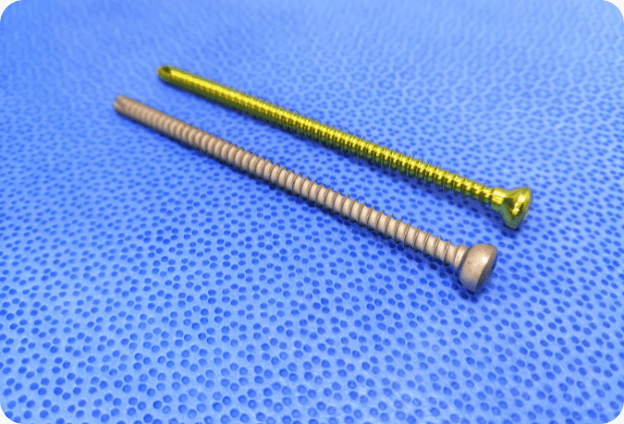No Bones About It: Third-Party Certification of Surgical Screws is Critical

A loose screw is seldom a good thing, but the stakes can be particularly high in the medical arena.
Surgical screws are implanted in the body to compress and stabilize broken bones, which aids in the healing process. They are a small, but vital, element in orthopedic surgeries. As one might imagine, the structural integrity and performance of these screws is vital to a successful orthopedic surgery — and to the patient’s recovery. Third-party certification helps to give manufacturers and users confidence that this tiny tool is ready and able to do its important job.
In addition to their potential impact on human health, surgical screws and other implantable devices often feature intricate geometries, miniscule features and tolerances with little wiggle room. For these reasons, surgical screws and other implantable medical devices call for world-class inspection capabilities.
Regulatory agencies around the world require that validated, carefully controlled processes be used in the manufacture of medical devices. An accredited, third-party lab will give regulators, manufacturers, suppliers, doctors and patients peace of mind that surgical screws meet all specified standards and regulations and will perform as designed.
Benefits of Third-Party Certification
Third-party certification is performed by an independent lab that has no affiliation with the manufacturing company and no vested interest in the sale or success of the product. There are a number of compelling reasons to work with an independent third-party to inspect and certify surgical screws:
- Enhances Safety & Quality: When performed by unbiased experts in ISO-accredited labs, third-party certification provides an objective review and completely independent assurance that surgical screws meet all applicable standards and specifications for safety, quality and performance.
- Cost Effective: Partnering with a third-party lab for testing and certification allows manufacturers to avoid purchasing costly testing equipment and hiring in-house metrology experts. In addition, independent labs have the technical skill, expertise and experience to streamline the testing and certification process, compared to manufacturers whose experience in this realm may be limited.
- Greater Marketability: Suppliers, distributors, customers and users have greater confidence in the safety of a product when it has been certified by a qualified third party. This in turn may translate to greater acceptance and competitiveness of the product in the marketplace.
- Liability: If liability issues arise against a medical manufacturer or supplier, third-party certification offers an added measure of protection by showing that a higher level of care was taken to ensure the product meets safety and quality standards.
What to Look for in a Third-Party Lab
In light of how vital medical devices are to the lives of people who rely on them, it is critical that manufacturers choose the right dimensional inspection lab for medical device components. Beyond ensuring that parts meet specifications, you’ll know you have data you can depend on.
When choosing a dimensional inspection lab to measure elements of your medical device, choose a lab with deep experience and a wide breadth of equipment to meet your unique needs. Medical devices come in many shapes and sizes, and the methods of measurement vary just as much. For example, 3D scanning has evolved over the years to become a highly effective way to measure medical devices.
In addition, leading metrology labs maintain strict cleanliness standards and a testing environment that is carefully controlled for temperature, vibration and humidity. Strict internal quality assurance protocols and routine calibration and maintenance of inspection equipment should also be deciding factors in your choice of lab.
Choose a lab with specific services that cater to medical device manufacturers or their suppliers, such as:
- Nano-Measurement Capabilities – Medical devices are often a prime candidate for nano measurement due to the need to measure flatness, wear, texture, sharpness, and other characteristics that can affect the functionality of the device, but would not otherwise be revealed in a data set from conventional metrology measurement.
- First Article Inspection –In-depth evaluation of the first piece of your production run, also known as First Article Inspection, remains the best way to ensure that production processes are sound.
- Non-Contact Inspection – Often, medical devices, or aspects of them, are too small or too soft to use contact inspection techniques. Choose a dimensional inspection lab with the capability of performing non-contact video and optical inspection methods, as this is the best way to measure device components in such cases. Such techniques make use of conventional optical video probes, laser probing, 3D white-light scanning, fully programmable robotic multi-sensor measurement systems, and more.
Why Choose IIA?
From surgical tools to implantable devices, patients count on medical providers to use equipment that is safe, reliable, and free of contaminants. The medical industry counts on Industrial Inspection & Analysis (IIA) to ensure just that. Clients ranging from start-ups to major manufacturers turn to IIA for inspection, testing, and failure analysis of Classes I, II, and III medical devices.
Offering state-of-the-art laboratories and a nationwide reach, our Lab Services division is well equipped to provide third-party certification of surgical screws, as well as other implantable devices and medical instruments.
Beyond dimensional metrology, we offer a full menu of lab services, including reverse engineering, comparative CAD analysis, laser and CT scanning, chemical testing, mechanical testing, metallurgical testing, non-destructive testing, and calibration. Our team also understands the technical and regulatory demands of the medical industry.
As an ISO 13485 certified, ISO 9001 registered, and ISO 17025 accredited laboratory, IIA is committed to making sure your medical device components meet your expectations. Our fully equipped dimensional metrology lab and our staff of highly experienced veterans can help our customers maintain their product’s integrity — and their company’s reputation.
LEARN MORE




